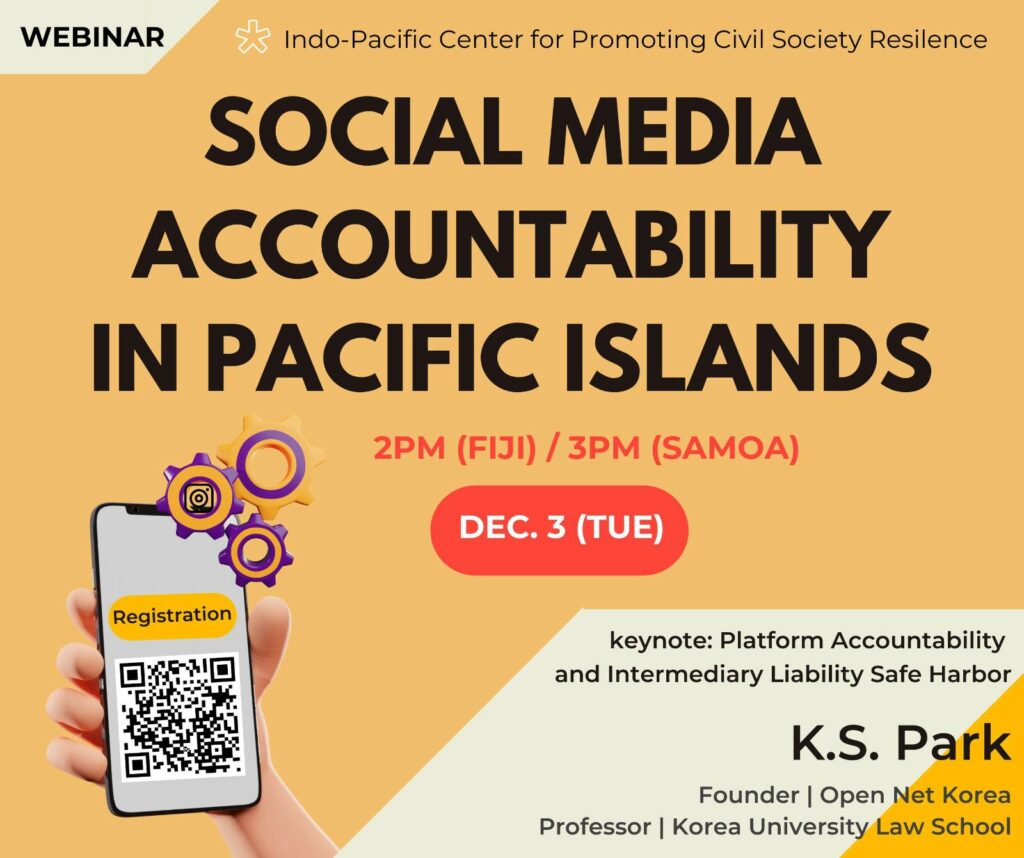
While people across the Pacific Islands increasingly rely on social media platforms in their daily lives, companies like Facebook have made minimal efforts to address the unique needs of the Pacific. This webinar is a starting point to collect Pacific regional insights and help to find the strategies to hold the social media platforms more accountable.
Date: Dec. 3 (Tue.)
Time: 10am-11am (Taiwan) | 11am-12pm (Korea) | 02pm-03pm (Fiji) | 03pm-04pm (Samoa)
Platform: Google meet
Target: Pacific-Islands participants including Pacific Islands Chapter of the Internet Society, Samoa IT Association and maybe journalists.
Agenda:
[10-15 mins] Regional status by Mr. Leaso Ronnie Aiolupotea. He is the Deputy CEO of Samoa’s National Computer Emergency Response Team (SamCERT) and is also Deputy Chief Executive Officer/ Chief Cybersecurity Officer, Ministry of Communications, and Information Technology of Samoa. Mr. Aiolupotea will introduce the current status of social media usage in Samoa and the Pacific region, including Samoa government’s policy on regulating the social media platforms
[20-25 mins] Key share by K.S. Park. one of the founders of Open Net Korea, a forum for discussion and collaboration on ICT freedoms and human rights since 2013, also the professor in Korea University Law School. Prof. Park is also one of drafters of Manila Principle for Intermediary Liability/Author of “From Liability Trap to the World’s Safest Harbour: Lessons from China, India, Japan, South Korea, Indonesia, and Malaysia” in Oxford Handbook for Intermediary Liability. He has involved the panels on “Platform Accountability in South and Southeast Asia” and “Content moderation policy advancing technology for democracy” in Asia-Pacific Internet Governance Forum (APrIGF).
The gist of his presentation can be found here.
[15 mins] QA discussion
[5 mins] Wrap up
Potential sharing points:
- What is platform accountability? If it’s about social media platforms, what would be different or need to be paid attention?
- Would the western framework such as DSA work for the Pacific region? What can the Pacific learn from DSA?
- What can civil society do to engage social media platforms? In particular, if Pacific island countries are not a priority area for social media platforms, how to combine forces or use strategies to deal with large platforms? (Facebook is most popular in the Pacific islands)
- Good examples, such as cases from SouthEast Asia.
- How the Pacific Islands Became a Hotbed of Online Misinformation
Questions from the audience:
- How do we hold governments and international organizations accountable for all of the misinformation they put out, especially during covid?
- How are you ensuring the community has the greatest voice in developing the code of conduct? In NZ multi national companies wrote the code, a conflict of interest.
- How can we protect the safety and objectivity of information published on social media, especially in places still building their legal infrastructure?
- What is the best course of action for CSOs working with governments to build a sustainable legal framework for social media (Like in the pacific)?
- What requirements are there of pacific governments to implement DSA
- Who determines what is correct information, with pandemic propaganda forced by i.e The Biden administration? Promoting economic gains for big pharma vs safety.
- Can we create a transparent, decentralized verification system that protects scientific freedom, censorship, and ensures public safety, and informed consent?
- Can blockchain technology and AI play a part in disseminating information and misinformation in the Pacific? For instance, Oracle networks like those provided by Chainlink and monitored to validate scientific debate, studies and research?
Sponsored by : Indo-Pacific Center for Promoting Civil Society Resiliences (The Center)
———————————————————
The Center, which comprises Freedom House as well as ARTICLE 19, Asia Citizen Future Association, and Doublethink Lab, endeavors to strengthen the bond between civil society organizations (CSOs) across the Indo-Pacific region (IPR) to counter digital authoritarianism, disinformation, and protect civic space in the Indo-Pacific Region. The Center aims to build the network which serves as a collaborative platform where passionate, expert individuals and organizations can gather. It is a space to explore vital themes, share best practices, and collectively address challenges on digital authoritarianism, disinformation, and legal threats faced by civil societies in IPR countries.


0 Comments